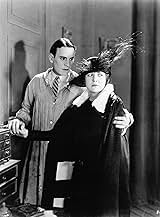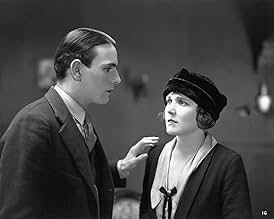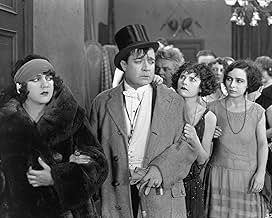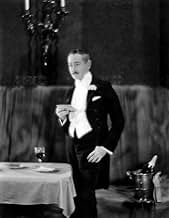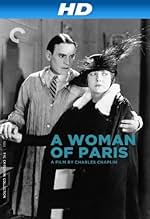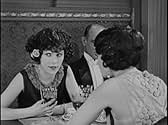IMDb RATING
6.9/10
6.6K
YOUR RATING
A kept woman runs into her former fiancé and finds herself torn between love and comfort.A kept woman runs into her former fiancé and finds herself torn between love and comfort.A kept woman runs into her former fiancé and finds herself torn between love and comfort.
- Awards
- 3 wins total
Charles K. French
- Jean's Father
- (as Charles French)
Nellie Bly Baker
- Masseuse
- (uncredited)
Henry Bergman
- Head Waiter
- (uncredited)
Charles Chaplin
- Station Porter
- (uncredited)
Frank Coghlan Jr.
- Boy
- (uncredited)
Antonio Corsi
- Accordion Player
- (uncredited)
Harry d'Abbadie d'Arrast
- Man in Nightclub
- (uncredited)
Stella De Lanti
- Revel's Fiancée
- (unconfirmed)
- (uncredited)
Jean de Limur
- Man in Nightclub
- (uncredited)
Charles Farrell
- Man in Nightclub
- (uncredited)
Bess Flowers
- Mannequin
- (uncredited)
- Director
- Writer
- All cast & crew
- Production, box office & more at IMDbPro
Featured reviews
Finally saw Woman of Paris: this was a legendary film in its day, but mostly because it was virtually never re-released for sixty years after it premiered in 1923, so the legend grew in its absence. The parts of the story that were not told would have made a better movie than the movie, for example why the lovers' fathers at the beginning of the film are against the marriage, and how Marie (Edna Purviance) became a (shudder) "Woman of Paris" during the year following her departure from her fiance. So I didn't buy the story but the camera work and editing do marvelous things with the story that is there. The melodramatic climax is a bit much to be believed, but not comical as a lot of silent mellers appear today. A little D.W. Griffith (sophisticated early use of photography to tell story and set mood), a little Tolstoy ("bad woman" story contrasted with storyteller's emphasis on happy marriages and wholesome family life), a touch of Dreiser ("sinful" characters shown with realistic insight) and I'd guess a soupcon of Terrence Ratigan (sophisticated attitudes) but I doubt he was around then. The ad copy for this film says Chaplin has a cameo as a railway porter but I didn't notice one in the train scene: I suspect instead he was the ticket agent whose hand appears pointing out the ticket window toward the train. Altogether a satisfying and entertaining film, but the story would have been better if Chaplin had worked on it a little longer.
The second film in my somewhat unusual Charles Chaplin double feature (after the delightfully black 'Monsieur Verdoux (1947)'), 'A Woman of Paris' is perhaps the silent comedy master's least mentioned film, perhaps partly due to it not actually being a comedy, or because Chaplin himself appears only in a very brief cameo role. His first and, I'll venture, his only strictly dramatic feature, the film traces the romantic dilemma of a young French woman living in Paris. It was Chaplin's first film with United Artists which he had founded in 1919 with Douglas Fairbanks, Mary Pickford and D.W. Griffith. Originally entitled 'Public Opinion' and then 'Destiny,' Chaplin considered a dozen more titles before he finally settled on a name.
Marie St. Clair (Edna Purviance) and her romance Jean Millet (Clarence Geldart), an aspiring artist, residents of a small French village, have plans to move to Paris and get married. However, unfortunate circumstances delay their plans, and Marie impulsively boards the train without Jean. A year or so later, Marie has assimilated into the upper-class lifestyle of Paris, having become the mistress of a wealthy, cynical businessman, Pierre Revel (Adolphe Menjou). It is then that she and Jean suddenly meet again. Though there are undoubtedly still feelings between them, Marie must decide whether she can sacrifice all of Pierre's luxuries to pursue the man that she loves.
Written, produced and directed by Chaplin, 'A Woman of Paris' is a tightly-paced drama/romance, employing a lot of dialogue (somewhat unusual for Chaplin, who usually relied on extended slapstick comedic set pieces to drive his silent films) and a three-way relationship that has since become commonplace in films of this sort. The film allowed Chaplin to extend his skills beyond the realm of the lovable little Tramp. Unfortunately, this seemingly was not what audiences wanted. Perhaps perceived as a harmful satire of the American way of life, 'A Woman of Paris' was banned in several US states on the grounds of immorality, and it was a commercial flop. Chaplin had conceived the film as a means of launching the individual acting career of Edna Purviance, though this bid was unsuccessful. It did, however, make an international star of Adolphe Menjou.
Many critics, despite the poor box office performance, praised the film's startling realism. Notably, director Michael Powell ('Black Narcissus,' 'Peeping Tom') cited 'A Woman of Paris' as his greatest inspiration to become a filmmaker. In 1976, a frail Charles Chaplin just one year before his death reissued the edited film with a new musical score he had composed, aided by music arranger Eric James. A criminally underrated silent classic, 'A Woman of Paris' is yet another testament to Chaplin's undeniable cinematic genius.
Marie St. Clair (Edna Purviance) and her romance Jean Millet (Clarence Geldart), an aspiring artist, residents of a small French village, have plans to move to Paris and get married. However, unfortunate circumstances delay their plans, and Marie impulsively boards the train without Jean. A year or so later, Marie has assimilated into the upper-class lifestyle of Paris, having become the mistress of a wealthy, cynical businessman, Pierre Revel (Adolphe Menjou). It is then that she and Jean suddenly meet again. Though there are undoubtedly still feelings between them, Marie must decide whether she can sacrifice all of Pierre's luxuries to pursue the man that she loves.
Written, produced and directed by Chaplin, 'A Woman of Paris' is a tightly-paced drama/romance, employing a lot of dialogue (somewhat unusual for Chaplin, who usually relied on extended slapstick comedic set pieces to drive his silent films) and a three-way relationship that has since become commonplace in films of this sort. The film allowed Chaplin to extend his skills beyond the realm of the lovable little Tramp. Unfortunately, this seemingly was not what audiences wanted. Perhaps perceived as a harmful satire of the American way of life, 'A Woman of Paris' was banned in several US states on the grounds of immorality, and it was a commercial flop. Chaplin had conceived the film as a means of launching the individual acting career of Edna Purviance, though this bid was unsuccessful. It did, however, make an international star of Adolphe Menjou.
Many critics, despite the poor box office performance, praised the film's startling realism. Notably, director Michael Powell ('Black Narcissus,' 'Peeping Tom') cited 'A Woman of Paris' as his greatest inspiration to become a filmmaker. In 1976, a frail Charles Chaplin just one year before his death reissued the edited film with a new musical score he had composed, aided by music arranger Eric James. A criminally underrated silent classic, 'A Woman of Paris' is yet another testament to Chaplin's undeniable cinematic genius.
A Woman Of Paris was an acclaimed success with the critics when it was Originally released on 1st October 1923. However, the audience despised it as they wanted to see Charlie Chaplin the tramp starring in a film not a film directed by Chaplin in which he does not appear (albeit in a small cameo role). When i first saw the film on BBC2 around Christmas 1998 i thought Chaplin had a starring role so was naturally disappointed when i found out this wasn't the case. However, since then i have become a huge fan of Chaplin and all his work so now I think this film is rated among Chaplin's best features. His musical score composed in 1976 with Eric Rogers was Chaplin's last ever work in his film career which spanned 62 years. By 1976 Chaplin was very frail and struggled to communicate so the fact that he could compose the music for a near 80 minute film is amazing and the fact that the music score is as good as any of his other films is also astonishing. Charles Chaplin was a true genius of Cinema and A Woman Of Paris is an excellent example of Chaplin as director, writer and composer.
Charles Chaplin is noted for his comedy performances, and deservedly.
His direction, though, should be more highly regarded, if only for this one motion picture.
Compare the quality of the photography and the smoothness of the editing to, for example, "The Gold Rush," of about the same time.
"A Woman of Paris" is very modern; "The Gold Rush" is downright primitive (but, in spots, brilliant).
"A Woman of Paris" also shows some admirable acting talent in, really, all the players. Some of the lesser characters are still played beautifully, despite being "lesser," especially Marie's maids and her, more or less, friends, and very especially the masseuse.
And the scene where the artist's mother, played by Lydia Knott, bent on revenge, comes upon Marie -- with no words, just body movement and facial expression -- she tells the audience what the proverbial thousand words could not so well.
Credit for part of that good acting must, of course, go to the director, but even the best director can't make much of poor actors.
Chaplin had very good actors. Adolphe Menjou reached stardom, and deservedly. What a tremendous talent; he could do everything.
Edna Purviance should have achieved much more acclaim. She performed admirably, especially in this movie, and she was attractive. Fame is certainly fickle.
In some ways, "A Woman of Paris" might be written off by a few as "soap opera." But it is well worth watching for the performances and, especially, for the directing.
His direction, though, should be more highly regarded, if only for this one motion picture.
Compare the quality of the photography and the smoothness of the editing to, for example, "The Gold Rush," of about the same time.
"A Woman of Paris" is very modern; "The Gold Rush" is downright primitive (but, in spots, brilliant).
"A Woman of Paris" also shows some admirable acting talent in, really, all the players. Some of the lesser characters are still played beautifully, despite being "lesser," especially Marie's maids and her, more or less, friends, and very especially the masseuse.
And the scene where the artist's mother, played by Lydia Knott, bent on revenge, comes upon Marie -- with no words, just body movement and facial expression -- she tells the audience what the proverbial thousand words could not so well.
Credit for part of that good acting must, of course, go to the director, but even the best director can't make much of poor actors.
Chaplin had very good actors. Adolphe Menjou reached stardom, and deservedly. What a tremendous talent; he could do everything.
Edna Purviance should have achieved much more acclaim. She performed admirably, especially in this movie, and she was attractive. Fame is certainly fickle.
In some ways, "A Woman of Paris" might be written off by a few as "soap opera." But it is well worth watching for the performances and, especially, for the directing.
If nothing else, you have to give Charlie Chaplin a lot of credit for taking a shot at something so different from his usual fare. (Though he himself only appears on-screen for a few seconds this time, he did almost everything else in the production.) And while "A Woman of Paris" is certainly a cut below his comedy features, it's a pretty good melodrama, and you'd have to think that with experience Chaplin could have gone on to become almost as effective with straight melodrama as he was with his sentimental comedies. It's not really surprising that after this he returned to comedy for good, but that was just to keep audiences happy, not because he couldn't do drama, since this is a decent effort.
Chaplin's own frequent lady Edna Purviance is convincing as the young woman whose tangled love affairs pull her away from her true love and into a set of tangled relationships in the empty, decadent world of the Parisian idle classes. Except for being rather contrived - there are far too many coincidences and pat developments in the plot, and they do not work as well in serious drama as they would in a comedy - the story is interesting and fairly creative. It does get a bit heavy at times, since there is very little comic relief, but Adolphe Menjou helps keep it from getting unbearably serious with a good performance as the carefree, irresponsible Pierre. He shows that even without dialogue he can make this kind of character lively and memorable.
Since it doesn't quite measure up to the standard of either the best Chaplin features or the best silent melodramas, "A Woman of Paris" may not have a niche of its own, except for its historical interest. But it's quite an interesting change of pace from Chaplin, and an above average movie that's worth seeing.
Chaplin's own frequent lady Edna Purviance is convincing as the young woman whose tangled love affairs pull her away from her true love and into a set of tangled relationships in the empty, decadent world of the Parisian idle classes. Except for being rather contrived - there are far too many coincidences and pat developments in the plot, and they do not work as well in serious drama as they would in a comedy - the story is interesting and fairly creative. It does get a bit heavy at times, since there is very little comic relief, but Adolphe Menjou helps keep it from getting unbearably serious with a good performance as the carefree, irresponsible Pierre. He shows that even without dialogue he can make this kind of character lively and memorable.
Since it doesn't quite measure up to the standard of either the best Chaplin features or the best silent melodramas, "A Woman of Paris" may not have a niche of its own, except for its historical interest. But it's quite an interesting change of pace from Chaplin, and an above average movie that's worth seeing.
Did you know
- TriviaThe reissue of this film, with a musical score and new cut by Sir Charles Chaplin, was the last work of his entire film career. By then, the 87-year-old Chaplin was visibly frail but still walking. His score was aided by arranger Eric James, and he took a small theme from Monsieur Verdoux (1947), but most of the score was Chaplin's. The film was reissued posthumously in 1977 with the new score to overwhelming critical and public praise. At that time, many critics praised it (as in the trailer) as one of the best films ever made.
- Quotes
[Intertitle]: Time heals, and experience teaches that the secret of happiness is in service to others.
- Alternate versionsDuring 1976, Chaplin was preparing a reissue of A Woman of Paris/Sunnyside but died before completion. The project was completed after his death, and the films were reissued in the United States by Kino International Corp. in 1978. This version, however, dispensed with an opening subtitle, as well as a few brief insert shots.
- ConnectionsFeatured in Chaplin Today: Modern Times (2003)
- How long is A Woman of Paris: A Drama of Fate?Powered by Alexa
Details
- Release date
- Country of origin
- Official site
- Language
- Also known as
- Una mujer de París
- Filming locations
- Production company
- See more company credits at IMDbPro
Box office
- Budget
- $351,000 (estimated)
- Gross worldwide
- $12,921
- Runtime1 hour 22 minutes
- Sound mix
- Aspect ratio
- 1.33 : 1
Contribute to this page
Suggest an edit or add missing content


